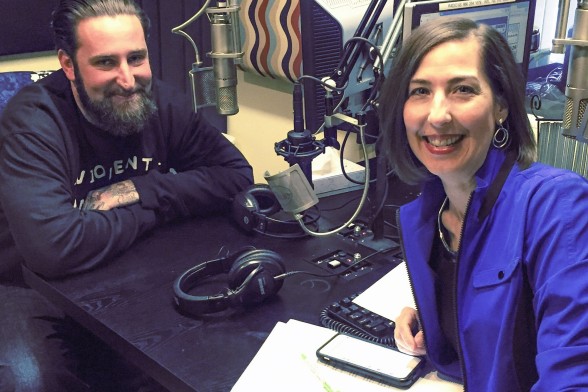
Hay House Radio Episode Recap
- Episode Name: “Sustainability: Healthy Body, Healthy Planet”
- Live Broadcast: Monday, March 7th, 2016 at 3:00 pm Pacific Time
 Special Guest: Chef Rob Ruiz has just won the prestigious international Ocean Award for bringing together scientists and the community for sustainable marine practices. Rob’s Awards and Sustainability Efforts | The Land & Water Company, Carlsbad, CA | The Ocean Award 2016 | Facebook.com
Special Guest: Chef Rob Ruiz has just won the prestigious international Ocean Award for bringing together scientists and the community for sustainable marine practices. Rob’s Awards and Sustainability Efforts | The Land & Water Company, Carlsbad, CA | The Ocean Award 2016 | Facebook.com
About Rob
Rob Ruiz put himself through college in Hawaii by diligently tackling all jobs, including mopping floors and cleaning fryers as a short-order cook. When Ian Whittemore of the famed Kona Inn Restaurant noticed his potential, Robert leaped at this mentorship opportunity. The next three years were spent focusing on French-cooking techniques, basic butchering, and sauteing. This extensive training and preparation enabled him to join Alan Wong at the five-diamond Hualalai resort. Here, Robert developed his keen sense of Hawaiian regional cuisine by working at all three restaurants on the property, re-creating Wong’s signature dishes and embracing the master chef’s philosophies. Under the continued tutelage of Hualalai’s executive chef, Etsuji Umezu, Robert’s distinct love of being a sushi chef was born. Umezu fostered his confidence as a sushi chef, even giving him the honor of serving the princess of Japan.
After extensive training and privileged apprenticeship under Hawaii’s finest chefs, Robert has become one of San Diego’s best non-traditional sushi chefs. His mentors taught him to know the source of every ingredient in each dish, and to make sure those ingredients were fresh. After witnessing fraudulent fish practices—such as restaurants misidentifying fish or passing off inferior-quality fish—he decided to find a way to provide truthful information to customers about fish species and sustainability. Working with NOAA (National Oceanic and Atmospheric Administration) fishery scientists, he developed the concept of an edible QR (quick reference) code for sushi with NOAA FishWatch information so that customers could make informed choices about their food.
Psychedelic Trip for the Tongue…Today, as owner and chef of the Land & Water Company in Carlsbad, California, Robert’s boundless creativity and delicious food creates word-of-mouth ripples throughout the community. His commitment to saving and preserving our oceans through his sustainability efforts is changing how fish and sushi will be served worldwide. Robert taught us that fish are seasonal, just like fruits and vegetables. We’ve eaten many times at his restaurant, where everything is sustainable, organic, and made with great passion for the land and sea. One of our Bone Broth Tribe members describes Robert’s food as a “psychedelic trip for the tongue.” It’s that good.
Read more about Rob at: landandwaterco.com.
Episode Summary Re-cap
Fish is wonderful for thyroid, brain and heart health, but how do you make sure you’re choosing healthy, seasonal and sustainable options? Heather talks with Chef Rob Ruiz, who has just won the prestigious International Ocean Award for bringing together scientists and the community for sustainable marine practices. Find out some quick tips to help you make informed choices about the seafood you are eating.
Rob Ruiz’s Tips for Sustainability and Choosing the Healthiest Fish
Fish Nutrition
Fish is a great source of iodine, which is a wonderful mineral for thyroid health, energy, and metabolism. Many fish contain bioactive peptides, which provide antioxidants and protective properties for the heart, as well as inhibit cancer, type 2 diabetes, and inflammation.
Choosing Fish
If you get to see the whole fish, look for crystal clear eyes. Open the gills and look for bright cherry red gills (they get brown the longer they’ve been out of the water). Check to make sure the scales look good and that they aren’t missing. Feel and smell the fish, make sure it’s not damaged.
Mercury & The Four S’s
There are so many health aspects to fish that it’s a great part of a healthy diet. To avoid high mercury fish, do not eat predatory fish that is higher on the food chain. These are larger fish, like tuna, jacks and yellowtail. To choose fish lowest in mercury, the four S’s provide excellent guidelines:
- Small – choose smaller fish, like anchovies, hake, sardines, herring, mackerel, perch and pollack.
- Seasonal – fish are seasonal! You can find out which fish are in season by asking at the seafood counter, your fish monger or doing a search online for seasonal fish in your area.
- Silver – silver fish that are lower on the food chain are a great choice. Sardines, mackerel and herring are wonderful options and you can use the whole skeleton for added collagen and minerals from the bones.
- Shellfish – the United States tracks all shellfish and tags them so that the date, where it was harvested and other tracking information is all on file. This makes it easier to trace the source of your fish.
Radiation
The radiation scare about fish was a myth started by a blogger who wanted traffic to his website. Research has shown that by the time fish was taken out of the water and processed for selling (even the fish that swam off the shores of Fukishima), it was considered safe to eat. Larger carnivorous fish may have more radiation than smaller fish feeding on algae and plankton; however, even larger fish have been measured at what experts consider a “low five Banana Equivalent Dose (BED)” of radiation. Banana Equivalent Dose is a term scientists use to simplify comparisons about radiation emissions. A fatal dose is 80 million BED.(1)
Overfishing is a concern for certain fish species. This can change from year to year, so check fishwatch.gov for updates. Here are some guidelines to avoid endangered fish populations:
- Know where your fish comes from – ask at the seafood counter. If they don’t know, don’t buy it. Your fishmonger can tell you where the fish came from or seek out a seafood supplier who knows the source of their fish. Ask at restaurants as well.
- Vote with your fork (dollars) – when at restaurants or purchasing seafood, always ask about the source and only purchase fish from suppliers who can tell you where they came from.
- Go to websites to get updates – since the status of fish populations change, check websites like fishwatch.gov, seafoodwatch.org and msc.org (the Marine Stewardship Council website).
Use the Whole Fish
Using the whole fish is a great step toward sustainability!
- Make bone broth – Fish broth in general can be a very affordable and easy way to make bone broth at home. Wild-caught fish and bones (for broth making, choose non-oily wild cold-water fish, such as Alaska or walleye pollock, sea bass, cod, and halibut); check fishwatch.gov and seafoodwatch.org for sustainability information. Note that wild caught shrimp from North America are most likely to be sustainably caught. If you live in a coastal area, you may be able to access people in the fishing industry, like fishmongers, who can save wild carcasses for you.
- Consume more of the fish – Fish skin is like the “bacon of the sea” and is full of collagen and essential fatty acids. Instead of removing it, cook the fish with the skin on. It’s delicious! There are many recipes online that show you how to make fish with wonderful, crispy skin. Fish liver is also much better than you may think! It’s not as “livery” as beef liver and has many benefits, like B vitamins and beneficial fatty acids for brain health. Rob makes a Thai snapper liver dish that is absolutely wonderful. Add a little pickled ginger and you have a delicious nutritional powerhouse!
Cooking Tips
- Add ginger and green onion to sardines for a wonderful gourmet taste.
- Enjoy crispy skin – to get crispy skin on your fish, pan sear the fish with skin on one side in olive oil. Sear on both sides for a few seconds (if you like your fish more rare) or up to 7 minutes for a more well-done fish.
- Seasoning ideas – one of Rob’s favorite cooking methods is to use a cedar plank to cook fish. You can get a cedar plank at many hardware stores. Purchase one wide enough to cook your fish and clean it well. You can also find cedar planks in cooking supply stores. Heat your oven, gas or charcoal grill to 325° – 350° F. Soak the plank in water for 15 – 20 minutes (some people like to soak the planks in wine, sake or apple cider). Brush the plank with olive oil (the side you’ll put the fish on). Put the fish skin down on the plank and season it with a mixture of maple syrup, Dijon mustard, sea salt and pepper. If using a grill, put the top down while the fish is cooking. Cook for 7 – 15 minutes, depending on how raw or cooked you want your fish.
Fish and Fish Bone Broth
Fish is a great source of iodine, which is a wonderful mineral for thyroid health, energy, and metabolism. Many fish contain bioactive peptides, which provide antioxidants and protective properties for the heart, as well as inhibit cancer, type 2 diabetes, and inflammation. Fish broth in general can be a very affordable and easy way to make bone broth at home.
Wild-caught fish and bones (for broth making, choose non-oily wild cold-water fish, such as Alaska or walleye pollock, sea bass, cod, and halibut); check fishwatch.gov and seafoodwatch.org for sustainability information. Note that wild caught shrimp from North America are most likely to be sustainably caught.
If you live in a coastal area, you may be able to access people in the fishing industry, like fishmongers, who can save wild carcasses for you.
Healing Recipe: Dashi Fish Stock by Rob Ruiz
from The Bone Broth Secret: A Culinary Adventure in Health, Beauty and Longevity
 Listen Again!
Listen Again!
Hay House Wisdom Community Members can listen to this show again anytime, and you can download and podcast this and over 10,000 archived audios from your favorite authors.
 Tune in Next Week
Tune in Next Week
Tune in next week to Loving Yourself to Great Health, when author and energy therapist, Amy Scher, will join me as we discuss how to heal yourself when no one else can. You will definitely want to join us to hear Amy’s story of searching the world and finally finding the answer to healing Lyme disease, autoimmune conditions, nerve damage, endometriosis, anxiety and more.
JOIN ME EVERY TUESDAY AT 12PM PACIFIC
Source
- Michael Conathan, “Fukushima Fallout Not Affecting U.S.-Caught Fish,” Voices: Ocean Views (blog), National Geographic, September 11, 2013.
Latest posts by Heather Dane (see all)
- Listening to Your Gut and Heart - April 24, 2019
- Breaking Through Resistance: Following Creative Energy - April 16, 2019
- Love Intuition: Follow the Energy to True Love - April 10, 2019


Mercury? Radiation? Healthy, sustainable fish tips+recipes! @TheLandWaterCo @HayHouseRadio https://t.co/NpGxACyrXH https://t.co/bmKIsHNLDS
These recaps are soooo sooo helpful.
Thank you, Neha — I am so happy to hear that you like them!